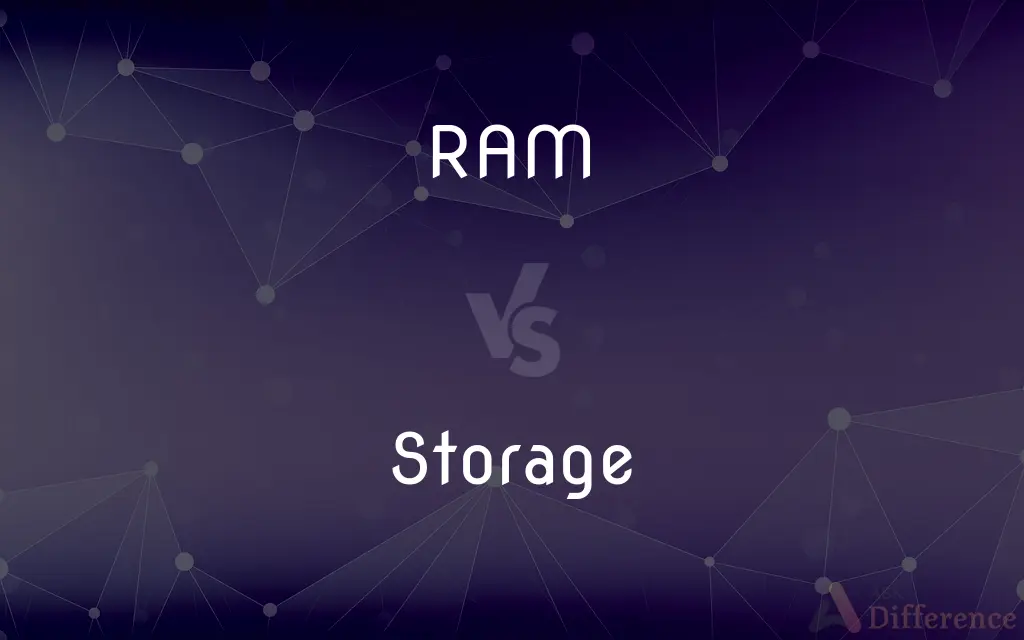RAM vs. Storage — What's the Difference?
By Fiza Rafique & Maham Liaqat — Published on June 23, 2024
RAM is volatile memory used for temporary data processing, crucial for system speed, while storage holds data long-term, like files and programs, affecting capacity but not directly speed.

Difference Between RAM and Storage
Table of Contents
ADVERTISEMENT
Key Differences
RAM (Random Access Memory) serves as a computer's short-term memory, temporarily holding data that the CPU accesses for running programs and processes. Its volatility means data is lost when the power is turned off. RAM's capacity directly influences a system's ability to multitask and handle complex tasks efficiently; more RAM allows for smoother operation of more applications simultaneously.
Storage, on the other hand, refers to the long-term retention of digital data, such as hard drives (HDDs), solid-state drives (SSDs), or flash drives. Unlike RAM, storage devices keep data even when the power is off, making them essential for saving operating systems, applications, and user files. The capacity of storage affects how much data a system can hold, but it doesn't directly impact the speed at which programs run, unlike RAM.
RAM is about immediate accessibility and speed, facilitating the quick retrieval and processing of data by the CPU, while storage is about permanence and capacity, ensuring data persistence over time. Upgrading RAM can significantly improve system performance, especially in handling multiple applications, whereas upgrading storage increases the data you can save and access over time.
The distinction between RAM and storage is crucial for understanding computer performance. High RAM ensures your computer can run multiple applications smoothly without slowing down, while ample storage means you can keep a large amount of data readily accessible for future use. Thus, both are important but serve very different roles in computer architecture.
In terms of upgrades, adding more RAM can be a cost-effective way to extend the life of a computer by improving its responsiveness and capacity to run demanding software. Increasing storage, especially upgrading from an HDD to an SSD, can enhance the overall user experience by reducing boot times and speeding up file access, although it won't directly affect the processing speed of tasks like RAM does.
ADVERTISEMENT
Comparison Chart
Type
Volatile memory
Non-volatile memory
Purpose
Temporary data processing for active tasks
Long-term data retention
Impact on Speed
Directly affects system speed and multitasking ability
Affects data retrieval times, not processing speed
Capacity
Measured in gigabytes (GB)
Measured in terabytes (TB) for large storage
Upgrade Benefit
Improves multitasking and program responsiveness
Increases data storage capacity
Compare with Definitions
RAM
Temporary storage for actively used data, enhancing system speed.
Upgrading to 16GB of RAM improved my computer's ability to run multiple applications simultaneously.
Storage
Permanent data retention, like files and programs, unaffected by power loss.
My SSD storage allows for quick boot times and ample space for my files.
RAM
Directly impacts performance by allowing more or complex tasks.
High RAM is essential for gaming and professional video editing.
Storage
Includes HDDs, SSDs, and flash drives for various capacity needs.
External hard drives are a cost-effective way to expand storage capacity.
RAM
Volatile memory cleared when power is off, crucial for immediate data access.
Losing power caused all unsaved data in my RAM to be lost.
Storage
Essential for holding an operating system, applications, and personal data.
Upgrading to a larger storage drive meant I could keep my entire photo library accessible.
RAM
Measured in gigabytes, indicating how much data it can hold at once.
Most smartphones now come with at least 4GB of RAM for smoother operation.
Storage
Affects how much data a device can hold, with potential for expansion.
Cloud storage services offer scalable space for data backup and sharing.
RAM
Can be upgraded to enhance multitasking capabilities.
Adding more RAM to my laptop made it much faster when switching between programs.
Storage
Upgrading from HDD to SSD can significantly improve data access times.
Replacing my old HDD with an SSD drastically reduced my computer's startup time.
RAM
Digital memory hardware in which information can be accessed in any order with equal speed.
Storage
(Computers) The part of a computer that stores information for subsequent use or retrieval.
RAM
A battering ram.
Storage
Any computer device, including such as a disk, on which data is stored for a longer term than main memory.
I′d recommend backing up these files to storage before reinstalling the operating system.
RAM
The most common computer memory which can be used by programs to perform necessary tasks while the computer is on; an integrated circuit memory chip allows information to be stored or accessed in any order and all storage locations are equally accessible
Storage
To put into storage; to store.
Storage
(computer science) the process of storing information in a computer memory or on a magnetic tape or disk
Storage
An electronic memory device;
A memory and the CPU form the central part of a computer to which peripherals are attached
Common Curiosities
Can I use storage as RAM?
While some systems use part of the storage as "virtual memory" when RAM is full, it's significantly slower than actual RAM, affecting performance negatively.
Does more RAM mean my computer can store more files?
No, RAM does not affect file storage capacity; it only impacts how efficiently your computer can run programs and process data. Storage capacity is determined by your HDD or SSD.
How does upgrading RAM affect my computer?
Upgrading RAM can significantly improve your computer's ability to run multiple applications simultaneously and handle more demanding software without lag.
Can I mix different types of RAM?
Mixing different types of RAM (speeds, brands, sizes) can work but might lead to reduced performance as the system will operate at the speed of the slowest module.
What's more important for performance, RAM or storage?
RAM directly impacts performance by enabling smoother multitasking and faster data processing, making it crucial for performance, especially in tasks requiring quick data access.
Is it necessary to have both high RAM and storage capacity?
While not necessary, having both ensures optimal performance (smooth multitasking with high RAM) and ample space for data and applications (with large storage).
How does virtual memory relate to RAM?
Virtual memory extends the capacity of RAM by using a portion of the storage drive as temporary RAM, although it's significantly slower than actual RAM.
What happens if my computer runs out of RAM?
When RAM is full, the system uses virtual memory, which can significantly slow down performance as it relies on the slower storage drive.
What type of storage is fastest?
SSDs are currently the fastest form of storage, offering quicker boot times, faster file access, and overall improved system responsiveness compared to HDDs.
Why is SSD storage considered better than HDD?
SSDs offer faster data access, lower power consumption, and higher reliability due to the lack of moving parts, compared to the mechanical nature of HDDs.
Does upgrading to an SSD improve RAM performance?
Upgrading to an SSD doesn't directly improve RAM performance but can enhance overall system responsiveness, especially in tasks involving data storage and retrieval.
Can I add more storage to improve my computer's speed?
Adding more storage won't directly improve speed unless you're upgrading from an HDD to an SSD, which accelerates boot and load times.
How do I know if I need more RAM or storage?
If your computer struggles with multitasking or runs slow with multiple applications open, you may need more RAM. If you're running out of space for files, you need more storage.
Why is RAM more expensive per GB than storage?
RAM is faster and more complex in its design than storage, leading to higher costs per GB. Its technology and manufacturing processes also contribute to the expense.
What are the environmental impacts of RAM and storage production?
The production of RAM and storage involves resource-intensive manufacturing processes and rare materials, contributing to environmental impacts such as resource depletion and electronic waste.
How do I choose the right amount of RAM and storage for a new computer?
Consider your usage patterns: if you run demanding applications or multitask heavily, opt for more RAM. For storage, think about the volume of data you need to store and whether speed (SSD) or capacity (HDD) is more critical.
Is there a limit to how much RAM or storage I can add to my computer?
Yes, computers have a maximum RAM capacity and a limited number of storage expansion slots or bays, dictated by the motherboard and device design.
Do all devices use RAM and storage in the same way?
All computing devices use RAM and storage, but the configuration and usage can vary significantly between devices like smartphones, tablets, and PCs.
What's the difference between internal and external storage?
Internal storage is built into the device and typically includes HDDs or SSDs, whereas external storage refers to removable drives like USB flash drives or external HDDs/SSDs.
Can cloud storage replace my computer's internal storage?
Cloud storage can supplement but not replace internal storage, as it requires an internet connection for access and is typically used for backup or to access files across devices.
Share Your Discovery

Previous Comparison
Triamcinolone vs. Hydrocortisone
Next Comparison
Sweat vs. SebumAuthor Spotlight
Written by
Fiza RafiqueFiza Rafique is a skilled content writer at AskDifference.com, where she meticulously refines and enhances written pieces. Drawing from her vast editorial expertise, Fiza ensures clarity, accuracy, and precision in every article. Passionate about language, she continually seeks to elevate the quality of content for readers worldwide.
Co-written by
Maham Liaqat












































